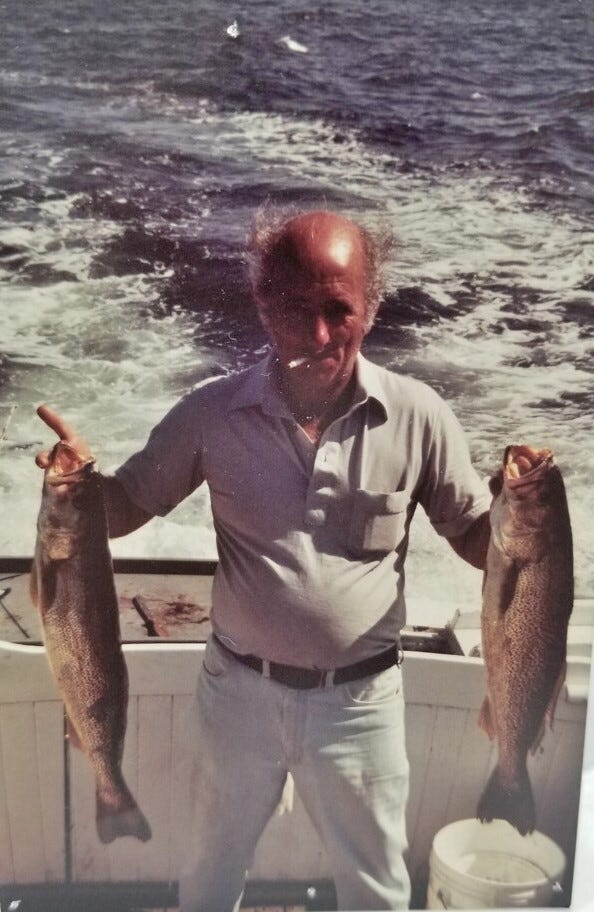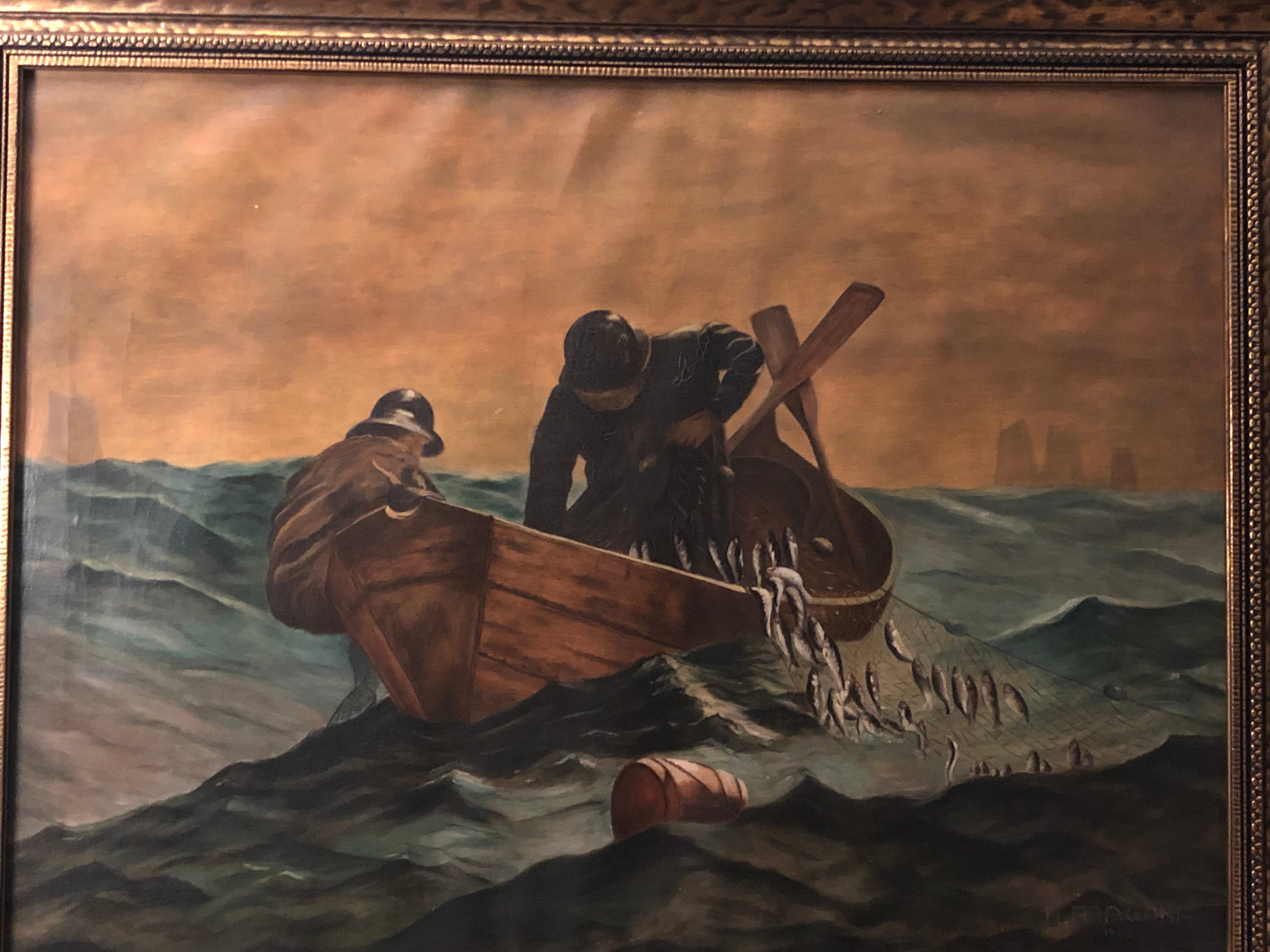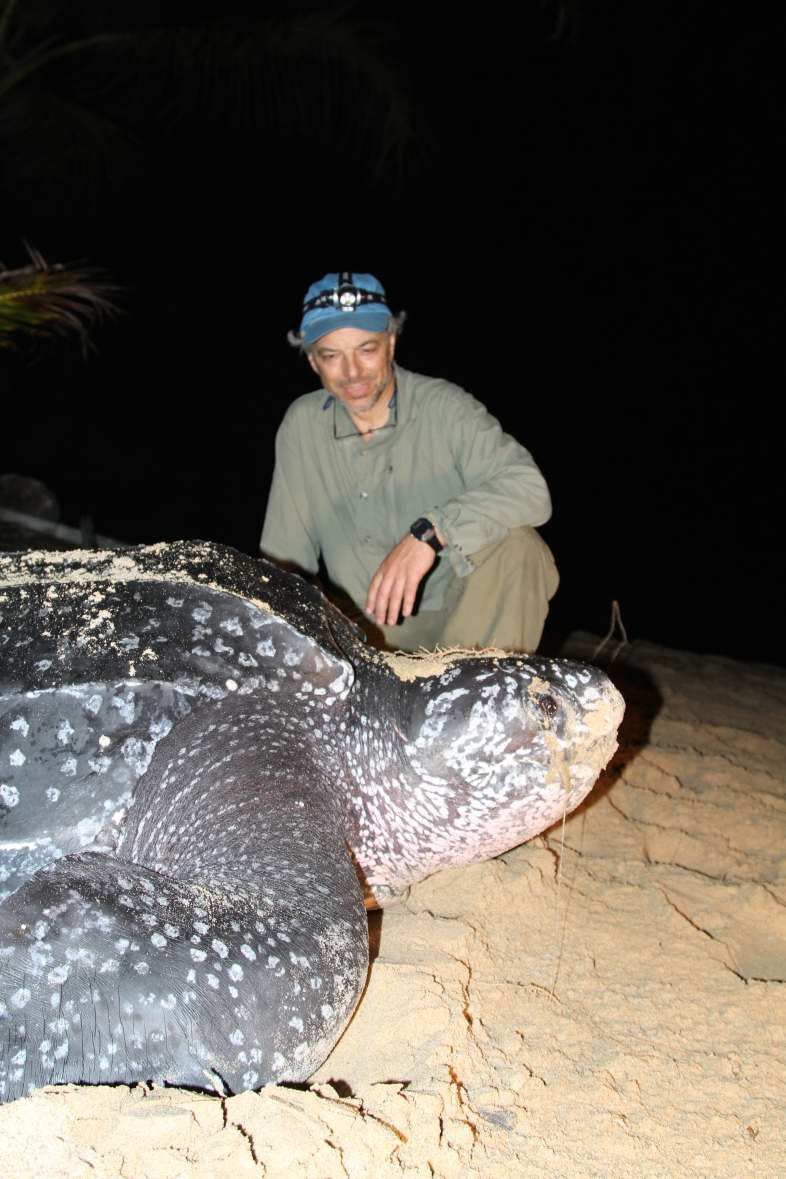Uncle Tony.
Photos courtesy of the author.
From Medium by Carl Safina
How my uncle’s generosity — and love of the sea — inspired me for a lifetime
Sometimes, early planted seeds that will germinate decades later into a writer’s life are planted by sources neither formal nor literary. Indeed mine were neither.
I had Uncle Tony.
What Uncle Tony had: An untrained eye for the beautiful and a willingness to share a little time near water.
But now he’s in a two-person room on the far side of the curtain.
Our visit is mostly a surprise.
As we file past the partition Tony takes in his visitors. It’s my mother, me…
“Here’s a person I haven’t met,” he says as we fully materialize.
“My wife,” I say, and before I can add, “Patricia,” he points to a photo of her on the wall, on a boat, holding up a halibut.
Tony had always been drawn to the sea, to boats, and to fish.
That drew me to him.
But today is only the third time I’ve seen my uncle in 10 years.
He’s not much of a talker so I seldom call.
At age 87 he’s got diabetes, recently pneumonia, everything hurts.
He refuses to complain and his energy is limited.
So the calls, which he always ends with, “I love you,” are short.
We all know he will not go home.
I feel ashamed that this is only our second visit here, and that he’s not previously met my wife of five years, considering how much a few brief experiences I’d had with him when I was in my teens have meant to me.
Recently he’d suffered several days of hallucinations.
His stepdaughter, Emily, advised we come soon.
Thus this hastily arranged trek to Staten Island.
I’ve been bracing for how we’d find him. But, though physically diminished, he is mentally very much himself.
Tony’s roommate has his TV tuned to a game show that he’s not watching, like everyone on this floor.
Except for my uncle, whose TV is never on.
He’s got the window, a view of distant Raritan Bay, and he’s got his wall of photos.
A crowd is gathered in front of a Brooklyn tenement on the day the government declared the end of World War II.
“That’s me, that kid on the right, half-hidden by the flag.”
The next photos of him are in military clothes in Korea.
There’s Josephine on the boat, fishing rod in hand, the late-arriving love of his life beaming her eternal smile.
In fact, the majority of the photos that keep him company are of people in boats with sunlit faces.
Uncle Tony’s copy of “The Herring Net”
It had momentarily slipped my wife’s mind that it was Tony who had painted the masterful reproduction of Winslow Homer’s The Herring Net that dominates our living room.
Next to his signature is the year, 1962.
“When I brought that painting home and you saw it,” Tony recalls with a chuckle as he adjusts his oxygen tube, “you said right then, you wanted it”
“Huge turtle?” Patricia picks up.
“What was it, a big snapper?” “Leatherback,” he says.
“You saw a leatherback? Where?”
“We were off the Rockaways that day.”
I was 14, so it was 1969.
We were fishing for tuna a few miles offshore — as you could in those days — within sight of Brooklyn.
Tuna fishing is hours of waiting that, sometimes, instantly turns into out-of-control pandemonium. I was wound with suspense.
Studying the sea surface for any swirl or fin, I noticed the mild chop breaking over something just under the surface.
Suddenly a surreal, mechanical-looking head the size of my torso lifted from the sea-foam and gasped a deep breath — it was a thousand-pound leatherback, by far the world’s largest sea turtle. The indelible sight never left my mind.
Author and the turtle
Tuna fishing is hours of waiting that, sometimes, instantly turns into out-of-control pandemonium.
Tony turns to me and says, “I never really got a great look at it when it was under the boat. I backed up when we cut the line.”
Soon after it had come up for air, it tangled in our heavy fishing line close to the boat.
I bent over the gunwale and got a clear look at its massive soft shell and angelic flippers.
An unstoppable force, it was quickly cut loose.
“You gave me a lot of work to do by getting me to see that leatherback,” I say.
Thirty-five years later my book Voyage of the Turtle was published.
“I went to see leatherback turtles nesting and migrating on three continents and in three oceans. Then we did the PBS show. You know how much time and money that all cost?”
“Sorry,” he says with mock sarcasm.
“Excellent book by the way,” he adds, surprising me a bit.
“And that was after the tuna fishing itself made me decide to write my first book,” I add.
“Hey, do you remember the article I wrote for Sea Frontiers?”
I had beamed with pride when I showed it to him, about 20 years after I’d pored through his magazines.
He doesn’t remember.
He’s getting tired.
We get up to say bedside goodbyes.
Patricia tells him she is so glad she’s finally met him and how much we enjoy having his painting of The Herring Net.
It’s so expertly done, you’d think it was the original.
“I gave them a few extra herring,” he confides.
For a man who never had the means for much generosity, he did what he could for the fishermen on the canvas, and the result has lasted decades.
About what he did for me, the same applies.
I want to kiss him.
But the cluttered reach to him in bed is awkward; I’m afraid of yanking on a tube.
I take his hands and say goodbye and walk into the hall.
I’m putting on my coat when Patricia overhears Uncle Tony say to his 93-year-old sister, “I guess this is the last time I’ll see ya.”
“You didn’t kiss him,” Patricia has also noticed.
I march back in and without mishap, I give him a kiss on his stubbled cheek.
It crosses my mind that this might be the first time I’ve ever kissed him.
“Thanks for that,” he says.
“Thank you.” I was seven years old. I had to wait for 50 years.
My uncle’s extraordinary talent for painting came to him effortlessly.
Unfortunately, nothing else did.
He was almost five when my immigrant grandfather hanged himself in their Brooklyn apartment, plunging a seamstress with four kids aged two to 11 into dire poverty, setting the family on a stagger from which no one ever quite recovered.
Despite enormous ability, painting was never more than a temporary avocation for my uncle, and after a few years he put his brushes down.
He’d been a starving child; he couldn’t afford to become a starving artist.
He bounced around a bit.
Eventually, he got a steady job in a boating supplies store in Sheepshead Bay, a paycheck he stuck with for as long as he worked.
I never saw him much but his interest in the sea interested me.
When I was 14, I decided to take a vacation: four days in my grandmother’s Brooklyn apartment just so I could hang out with Uncle Tony.
In his Mustang we drove to the New York Aquarium, where we marveled at the improbable sizes of old and obese specimens of fish that we loved to catch.
I snapped photos of doormat-sized fluke, bucket-sized black sea bass, and striped bass like logs.
At his home, I pored through his stacks of Sea Frontiers, an early magazine of scientific discovery for nonscientists.
Best of all, I was invited aboard Happy Days, the boat owned by Tony, my Uncle Sal, and a friend.
“You remember that huge turtle?” he says, knowing where this conversation will go.



No comments:
Post a Comment